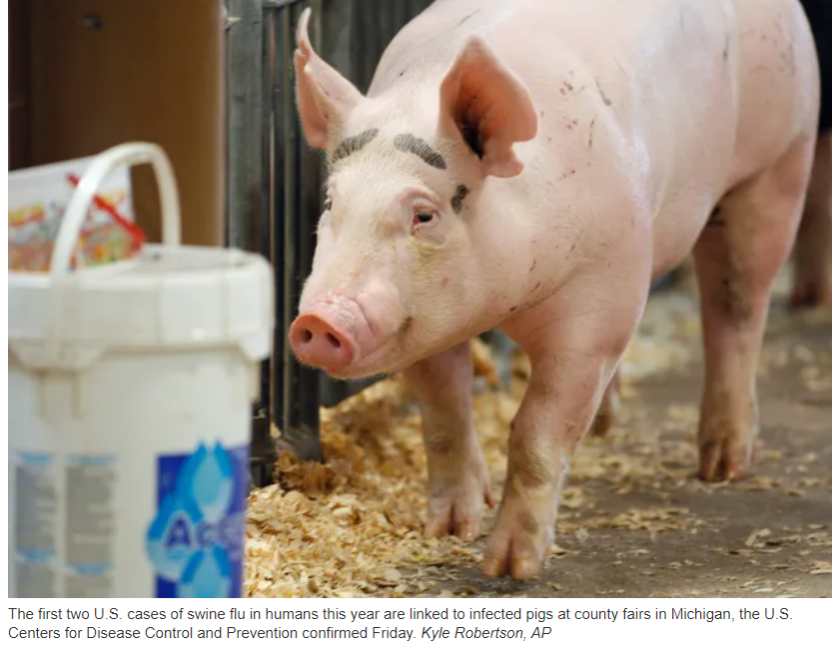CDC: Michigan has first 2 cases of human swine flu in U.S. this year

CDC: Michigan has first 2 cases of human swine flu in U.S. this year
By Kristen Jordan Shamus
The first two U.S. cases of swine flu in humans this year are linked to infected pigs at county fairs in Michigan, the U.S. Centers for Disease Control and Prevention confirmed Friday.
The first case involved a Lapeer County child who was an exhibitor at the Oakland County Fair, which took place July 7-16 at Springfield Oaks County Park in Davisburg. The child, who was identified by state health officials only as younger than 18, was exposed to infected pigs within 10 days of developing symptoms.
Preliminary testing showed the child had an A(H3)v strain of the virus, and samples were sent to the CDC for confirmation. The federal agency's confirmatory testing, however, was inconclusive because the respiratory specimen did not contain enough virus. Still, the CDC said the child likely was infected and is counting it as the first U.S. human case of 2023.

The child was treated with flu antiviral drugs, was not hospitalized and has recovered from the illness. No person-to-person spread of this virus has been identified among the child's close contacts, federal health officials said Friday.
The Michigan Department of Agriculture and Rural Development and Department of Health and Human Services notified Oakland County Health Division that several pigs present at the fair tested positive for influenza A virus. The pigs began displaying symptoms on July 14, and the swine barn was closed to the public that evening.
A second case, different strain
The second case involves a Tuscola County resident who had flu-like symptoms after attending the Tuscola County Fair, according to the county health department. The fair took place July 23-29 at the fairgrounds in Caro, in Michigan's Thumb.
That person tested positive for a different strain of swine flu — A H1N1v — and also was treated with influenza antiviral drugs. The person was not hospitalized and is recovering. To date, no person-to-person spread of this strain of the virus has been identified, either, the CDC reported.
The Tuscola County Health Department is asking anyone who developed flu-like symptoms after attending the county fair to call the department at 989-673-8114 or contact their primary care provider.
The health department has alerted local physicians' offices to watch for patients who have respiratory symptoms and also have been exposed to pigs or visited the fair.
How does swine flu spread?
Pigs can be infected with influenza virus strains that are different from human flu viruses, but can sometimes spread them to people. Transmission occurs mainly through droplets when infected pigs cough and sneeze, according to the CDC.
If the droplets land in a person's nose or mouth or if they are inhaled, people can be infected. People cannot get swine influenza from eating properly prepared pork or handling pork products. Like flu viruses in humans and other animals, the strains that spread among pigs change constantly. Pigs also can be infected by both avian flu and human flu viruses as well as their own flu viruses.
